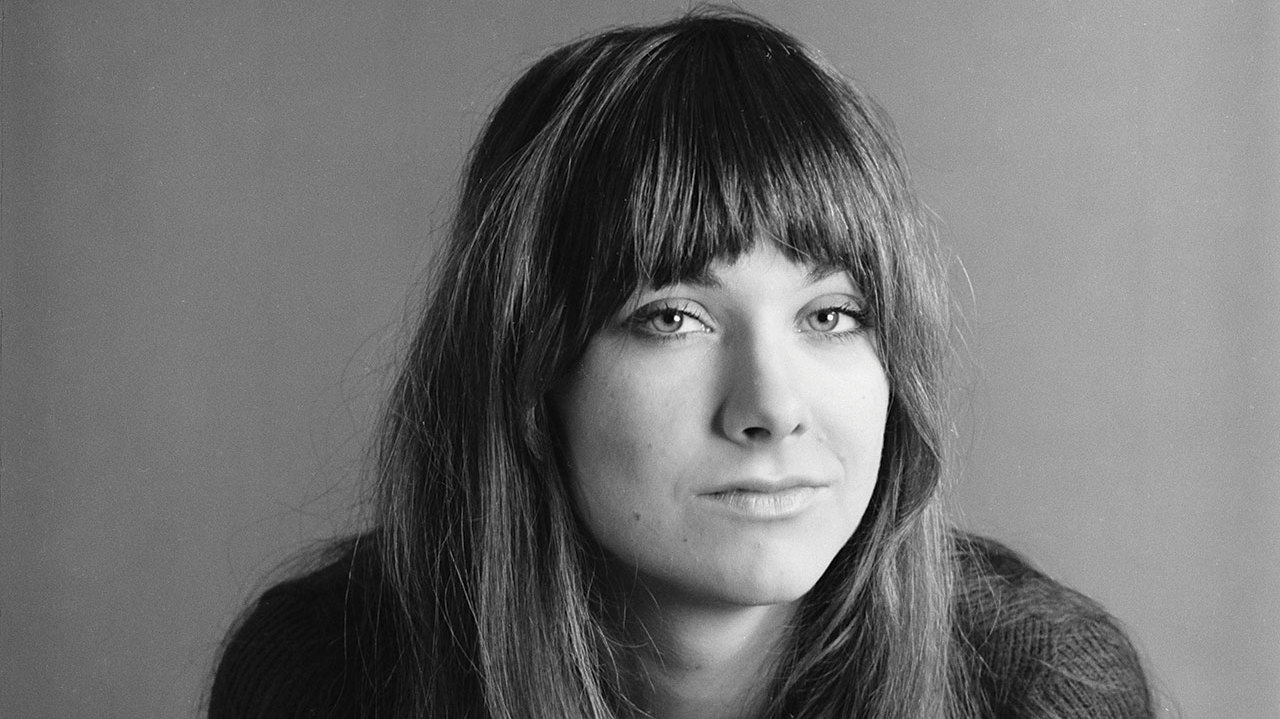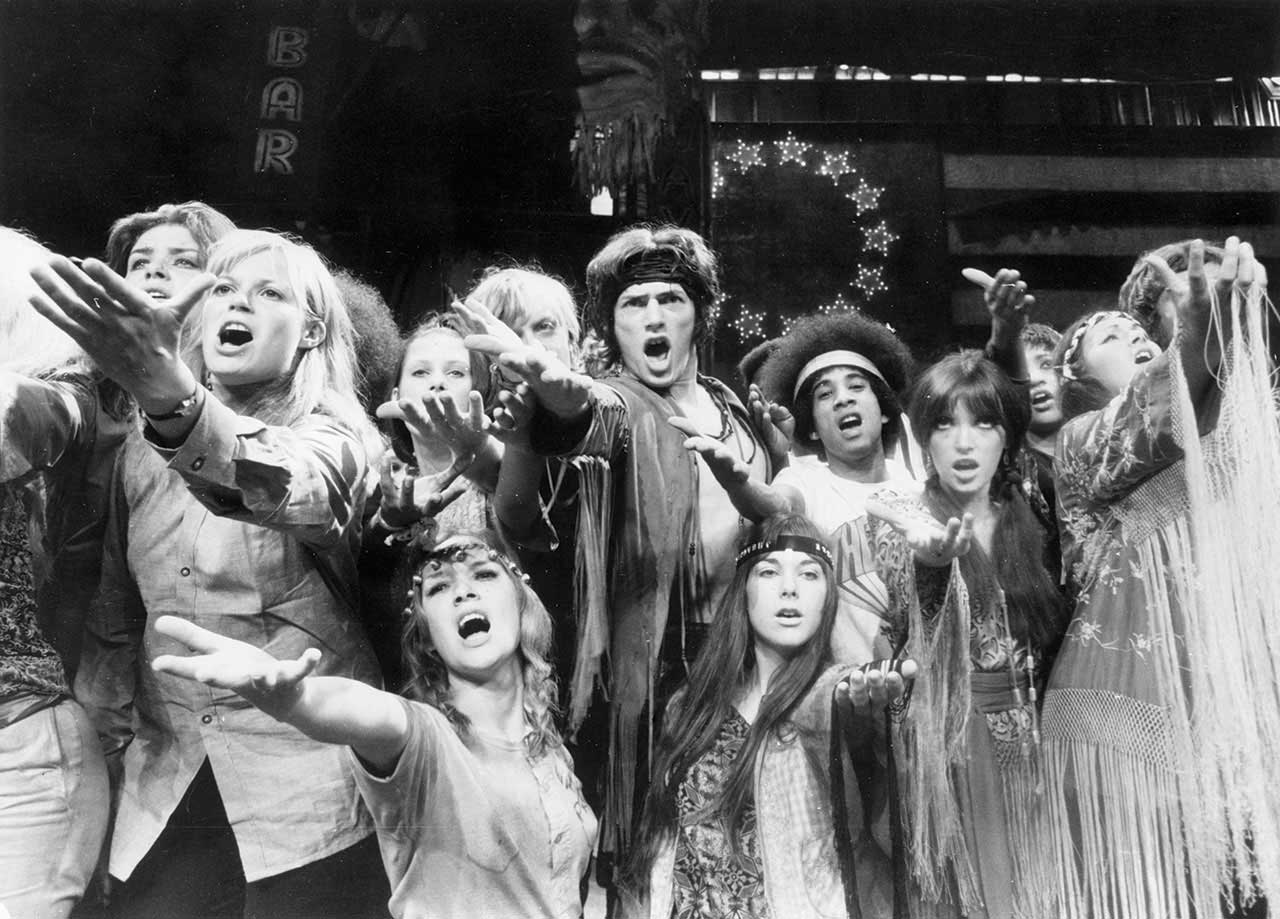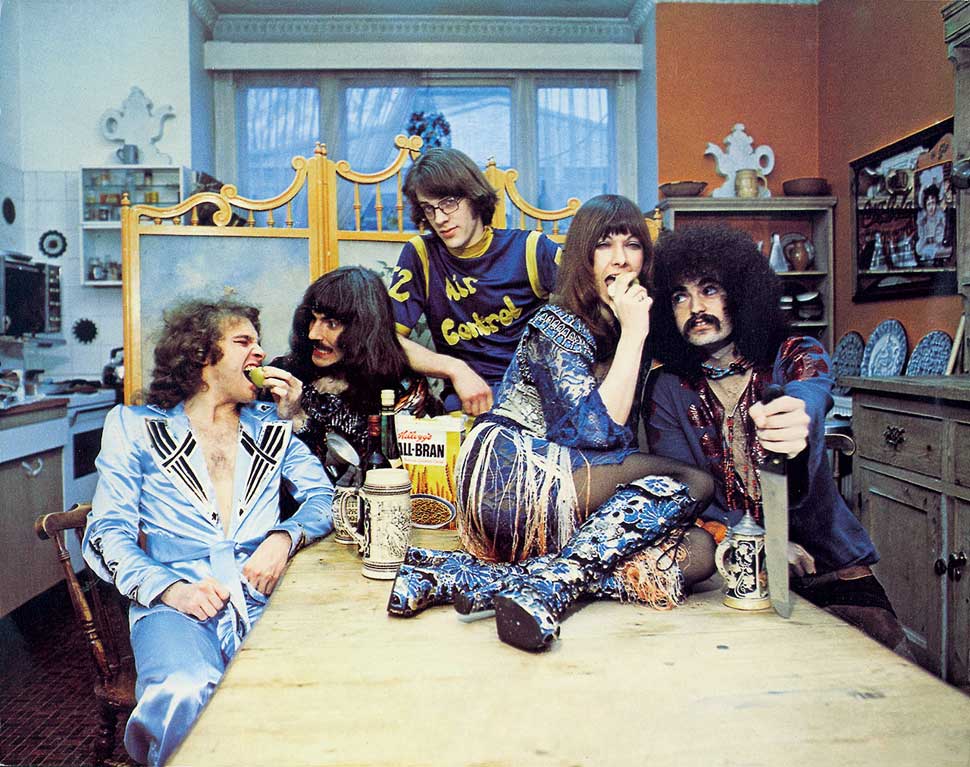
Born Sonja Christina Shaw, Sonja Kristina has been a crucial figure on the progressive rock scene now for close on five decades.
The granddaughter of acclaimed Swedish actress Gerda Lundequist, she first got noticed when playing the role of Crissy in the original West End production of Hair in 1968. Around this time, Kristina was involved in running the famed Troubadour Club in West London, a haven for folk musicians. In 1969, she was brought into the fledgling Curved Air line-up as their vocalist, and over the next few years not only helped to establish the band as one of the most individual and exciting bands on the progressive scene, but she also became a fully-fledged sex symbol.
When Curved Air split up in 1976 after releasing six studio albums, Kristina took various jobs in order to support her young family: she not only returned to Hair when a new production opened, but she also became a croupier at the Playboy Club in London.
Thankfully, she came back to the contemporary music scene in 1980 with the release of a self-titled solo album, showing she had lost none of her talent.
Subsequently, not only has the vocalist continued to put out albums, both under her own name and also as part of the multi-media duo MASK with Marvin Ayres, but she has also been a crucial part of the reunited Curved Air. Since the band returned to action in 2008, they have toured regularly.
In 2014, Kristina received the Guiding Light accolade at the Progressive Music Awards. She has remained true to her own instincts and spirit, and has evolved into one of the most charismatic performers of the last five decades. And yet, she has also been a constantly enigmatic figure, a fact that has helped to encourage a burning fascination about who she really is, and what drives her. In 2018 she revealed some of those details to Prog.

When did you first sing in public?
At school. I used to do songs like My Grandfather’s Clock, accompanying myself on guitar. That was to assembly gatherings. I also did proper concerts at the local boys’ school!
Did your parents encourage your artistic pursuits?
Oh yes. When I was trying to learn a tune a day my dad would give me a shilling for every one I succeeded with. That was his idea, not mine. My mum would sit and listen to me reciting poetry and extracts from Shakespeare when I needed to do that for any exams. My mother was talented enough to have gone onstage if she’d wanted. I have tapes of her singing, which were done from very scratchy recordings. And my dad was once an amateur puppeteer.
Do you come from a large family?
I have two brothers, six and eight years older than me. That meant they had moved out from the family home when my dad had a stroke when I was 13. So I had to visit him in hospital on my own, sitting in a dark car park trying to do my homework. Around the same time, my mum was hospitalised with kidney stones. For a while I lived with the family of a friend of my dad’s who ran a children’s home, because my brothers had moved away.
Would you say you are an extrovert?
Not really. Onstage I do get a rush, which gives me extra confidence. I am nervous before a performance. But once it starts, I am in the zone and focused. But when I am offstage I am not particularly sociable. I tend not to be good at parties when I don’t know anyone – unless I have consumed substances! But I am fine in one-to-one situations.
Who were your vocal role models?
I would have to mention Buffy Sainte-Marie, who was the first singer who wowed me. I learned several of her songs and would perform them at folk clubs alongside my own. I also loved Sandy Denny. What both of them have in common was being powerful and passionate, which was different to many other twee female singers back then.
What did being in Hair teach you about performing?
Everything. Yes, I did learn a certain amount at drama school. But in Hair, we learned to use our energy to fill the space, to trust one another, while relating truthfully as people. We were also encouraged to be spontaneous, and to leave everything of ourselves on that stage.
When you were in that production, did you see yourself going in a more theatrical direction, as opposed to being in a band?
Oh, no. I was still into singing at the drop of a hat. Even when I was in Hair, I’d go along to restaurants with friends, and would take little encouraging to strum a few songs. I never thought musical theatre was for me. I did a couple of other theatrical productions, like The French Have A Name For It (1979) and Man To Woman (1982), but that was never where I saw myself going full time.
You were involved with The Troubadour at a young age. Did it teach you about the business side of the music industry?
I was 19 when I ran my own night at the club. But I did it through serendipity and intuition rather than hard business acumen. For instance, one day I ended up chatting to someone on the tube and it turned out he did lights. So I got him along to do the lights at The Troubadour. I’d meet poets and folk musicians, and ask them to come down and perform. That was the way it all happened. I also had good friends like Al Stewart appearing. Overall it was a very successful time, but I was deeply in love with the hippieness of it all, rather than learning about the music business.
You did one show with Strawbs. Why didn’t it go any further?
Dave Cousins was – and still is – a friend of mine. So, when Sandy left the band, he asked me to do a gig with Strawbs. But after that they decided not to get in a vocalist, as it was a lot easier for them. As I was still at college and didn’t want to drop out to join a band, that was fine by me.

Were you in any other bands prior to Curved Air?
I did a few shows with Picadilly Line, who went on to change their name to Edwards Hand. We even got to do a gig at The Marquee Club in London – that was a highlight. They had some really nice songs.
What musical instruments do you play?
I play basic chords on the guitar and can also play melodies on piano, which is useful when I give vocal lessons. I wish I could play the guitar better, and would love to find the time to improve.
When you joined Curved Air, were you at all intimidated by being in a band with Darryl Way and Francis Monkman, who were classically trained?
Not at all. The fact they were so well musically trained made no difference to me. I liked their songs, and also the fact they were keen for me to write lyrics to fit. I love working with words. In general, I am not easily intimidated or overawed by people or situations.
All the members of Curved Air lived in a London flat together for a few years. That must have been chaotic!
No more chaotic than living with a family. Most of the time we were kept busy rehearsing, touring or writing. We all had our own rooms at the flat, although Florian (Pilkington-Miksa, the band’s original drummer) had his bed in the living room. It was natural for me to bond with everyone, and so had no problems getting along with everyone.
When Backstreet Luv became a big hit, did you feel like a pop star?
I suppose in a way I did. We did Top Of The Pops, and had a car sent for us. But because I made TV appearances before on a folk music show, so was used to that sort of treatment. Being on a show like Top Of The Pops was fascinating, because of the way the audience and the bands interacted. It was like watching natural history in action!
How did you deal with being a sex symbol?
I suppose it was intriguing. It was certainly strange to have all these young boys adoring me. I was 20 or 21 at the time, and the lads at the front of the stage were 15 or 16, and they were gazing at me almost in worship. But part of performing is to relate to the audience, to reach out and touch them. I was never afraid or worried about doing that. It wasn’t me trying to be sexy, but just being myself.
Did you have any pre-gig rituals you’d go through?
This might sound odd, but I had a skipping rope that I’d use before going onstage. I would use it to get the my energy levels right up, and that was a great way of preparing. Simple, but effective.
How did you feel about being the only woman in the band?
That never bothered me – or them for that matter. We had no inhibitions. I was very comfortable getting undressed in front of them. It wasn’t that I was one of the boys, but more that we accepted each other, and could therefore be fully open.
You were in a relationship with Stewart Copeland when you were both in Curved Air. Did that cause friction with the other band members?
No, it did not. I think the guys in the band had already gotten used to me being involved with someone from a touring party. Before we released our debut album, Air Conditioning, Curved Air toured with Black Sabbath, and I had a relationship with their manager, Malcolm Ross. Everyone was very cool about that, and there was never a sign of friction, so when Stewart and I got together, I never expected any problems. And there were none. Besides, the boys were busy hanging out with girls, so they had their own situations to deal with.

You have always come across as assertive and confident. Is that the real Sonja Kristina?
Do you think I am assertive and confident? I don’t know if everyone would agree with that description. I have been told by some people that I can come across as being very cold. As I said earlier, I am very comfortable when dealing on a one-to-one basis with people. That’s when I am a my best, which probably accounts for the way I can come over during interviews. However, put me into a crowd of people and I am very unsure of myself. At parties, I would lie down and actually pretend to be asleep to avoid having to talk to strangers. How people feel about me can depend on the circumstances, but I also have to admit that I never worry about what others think of me. I am very insular and in my own zone.
You were the only constant during Curved Air’s initial tenure from 1970 to ’76. Were there any times when you felt like quitting?
Yes, there were. When we did the albums Midnight Wire (1975) and Airborne (’76), I wasn’t at all happy with the musical direction the band were going in. Sure, we were getting a very strong reaction from the fans, who were going wild for us. But I was totally unmoved. I was dissatisfied with what we were doing. The original line-up had been technically superb, but also very exciting. But in that era Darryl was taking us into a much more blues rock and pop oriented approach, and that didn’t appeal to me. Sure, the musicians we had at the time were very gifted, and you cannot argue with what they brought to Curved Air. But I felt removed from it all. I was going through the motions, and did think about leaving to start my own band. The way Curved Air was heading wasn’t for me.
You taught performing arts students at Middlesex University in the 90s. What was that like?
Oh, I loved it. Because what I was doing was teaching on a one-to-one level. If you put me in front of a class and asked me to teach, then I would be totally lost. If you have a big group, then they’d all be at different levels, and inevitably some of the students would be disruptive, and they would all have differing tastes. That was never for me, which is why I could not work in that situation with a choir. But I am a natural when dealing with one pupil at a time, as happened at Middlesex University. I had my own music room and it was bliss. I even got to find out a lot about jazz from being there, a type of music I knew little about beforehand. I still teach, although not there.
You are seen as being a big inspiration to the likes of Kate Bush. Do you see your influence in the way she performs?
I do, yes. I look at what she used to wear and I know a lot of the style came from me. But there are a lot of surprising people who have claimed Curved Air inspired them.
Such as?
There’s Phil Oakey of The Human League, for example. I know he’s gone on record citing us as an important band in their development. And there’s also Rat Scabies of The Damned, who is a big fan, and also you can tell that Siouxsie Sioux has taken a lot from me…
You got to know a lot of punk musicians in 1976, didn’t you? Were they polite to you, given your prog background?
The strange thing is that there was no real problem. The media built up this mutual hatred between prog and punk, but really I don’t think it existed to the extent that was claimed. I used to go to a lot of clubs and saw a lot of the punk bands, and they were always complimentary about Curved Air. That might have been because they didn’t want to insult me, but I don’t think that was the case. I got the feeling a lot of the punks were fans of ours, and other prog bands. But it suited the media to build up this animosity. Mind you, there were some hilarious moments when I’d play a punk record to certain progressive musicians and all they would say is: “What is this noise?!”
What would you say is the most left-field thing you’ve done professionally?
That’s a hard one to answer. Most of the time, if anyone asks me to do something that is so off the wall that it would make me feel weird, then I’d refuse to do it, and immediately put it out of my mind. So I have rarely agreed to do anything like that. But Darryl did once suggest we should all wear pink cardigans onstage, including me. Did we do it? Certainly not!
Outside of Curved Air, do you have any musical plans in the immediate future?
I am going to be doing an album with the Norman Beaker Band, who are very respected in British blues circles. It will give me the chance to do some songs which would not fit into Curved Air. For instance, I am looking forward to tackling Baby, Please Don’t Go, which I have always wanted to record. The album should be a mixture of blues and other styles of music, and will stretch me in a different way to what happens in Curved Air.
Can you see yourself writing an autobiography?
I am not sure I'd like to write it myself. But I would really like someone to do it with me. Perhaps a ghost written book might be the answer. Actually, I did work on a synopsis for a book like that once, and that part is finished.
Any book would have to be truthful, but that can cause problems, because the last thing I want is to upset anyone by telling things the way they happened, rather than avoiding subjects. Too many autobiographies I’ve read have ended up as being very boring, because the writers try to get around any controversies by avoiding the subjects. These become just a litany of dates and bare facts – to me, that is so dull. One way round this might be for the book to be written as it it’s a novel, and then you can talk about anything without upsetting anyone. What I’d also want an autobiography to do it is to conjure up what it was like to live through the 1960s, which was an amazing time.
Another book which might be even more interesting would be based around 87 Redington Road in Hampstead, where Curved Air lived together for a few years. A lot of other bands also stayed there over the decades – it was a house which seemed to attract artistic types, and I feel a book of anecdotes from those who lived there would be fascinating.







